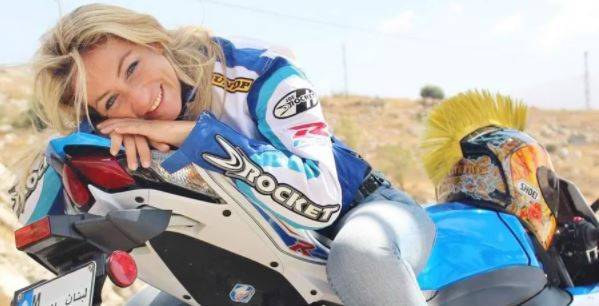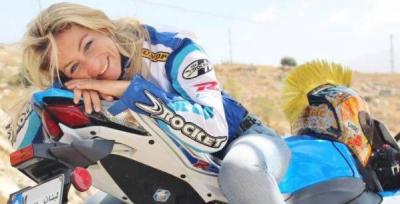"Sports bikes are not exclusive to men." This is what Lebanese engineer Mona Khattib, known to everyone as "Mony," asserts. She is one of the few women who have chosen to engage in this somewhat dangerous hobby. In a unique competition, Mona challenges her male peers in riding motorcycles on roads and in specialized races, often surpassing them despite the risks she faces and the numerous motorcycle accidents in Lebanon.
Talking with the young telecommunications and computer engineer takes you into terminology far removed from her scientific specialty, leading you to a realm of phrases difficult for those unfamiliar with motorcycle technologies to comprehend, starting from the bike's power and specific mechanical information to the names and types of races.
About this hobby, the daughter of the border town of Shabaa told "Sky News Arabia": "My story with motorcycles began in 2005 after a short ride a friend invited me on the roads of Beirut. The trip was enough to ignite a sense of adventure within me and make me fond of this enjoyable yet dangerous hobby. I need precision, focus, and correct calculations to avoid deadly mistakes."
The Beginning
Mona entered the field with passion and bought a small bike to train on. At that time, her activity was very secretive; it wasn't easy to convince family and friends of a hobby that some consider predominantly masculine, especially in Arab countries. Today, she rides her very powerful black motorcycle driven by a roaring engine that rivals sports cars with a capacity of one thousand cubic centimeters.
She added, "That's why I used to hide my bike from sight, as well as the sports gear designated for it and my helmet in my car to avoid any intervention that might hinder my hobby." She continued, "I am a nature lover and adore the world of hunting and trips, and I also engage in other hobbies such as diving, horseback riding, and skydiving."
Regarding her family’s knowledge of her motorcycle riding, Khattib said: "Once, a security checkpoint stopped me and asked for my identification and driver's license to check them. At that moment, a military vehicle stopped nearby, and my father, a former officer in the Lebanese army, was inside it. I then told the officer, 'I am the daughter of Colonel Khattib' and pointed to my father, who was stunned by the shock, and I rushed off on my way. My father then asked me to sell the bike, and he still insists on that every occasion out of concern for my safety."
She added, laughing: "I practice my hobby with discipline and without recklessness, and all the members of my team, Super Bike Riders Group, are like siblings to me and care for me a lot, despite my constant victories over them."
An Economical Means of Transport
On weekends, the passionate racing engineer spends her day off in designated areas for motorcycle riding, most notably on the asphalted roads in the port city of Tripoli in northern Lebanon, which motorcycle racing enthusiasts call "the black asphalt," and she often returns victorious to Beirut over the groups she participated with.
Mona does not love driving cars as much as she loves the motorcycle that burns its tires on the track, even if it costs her to buy new tires. Alongside this hobby, she also teaches motorcycle riding, saying: "Currently, there are many women who ride small motorcycles to get to work to save on gasoline."
She added: "My mother has always opposed my hobby, but now my mother, Hajjeh Aida, rides behind me on the bike to take her wherever she wants."
Khattib hopes for more attention to enthusiasts of this machine, which she considers an economical means of transport, and calls for ensuring suitable roads for it after the significant rise in fuel prices, seeing the possibility that small motorcycles could solve some transportation problems in Lebanon.
She concludes her conversation by saying: "I don't feel out of place being a woman among many men in this hobby, as I lived a similar life while studying engineering at a university that comprises more than 90 percent male students in this field."




